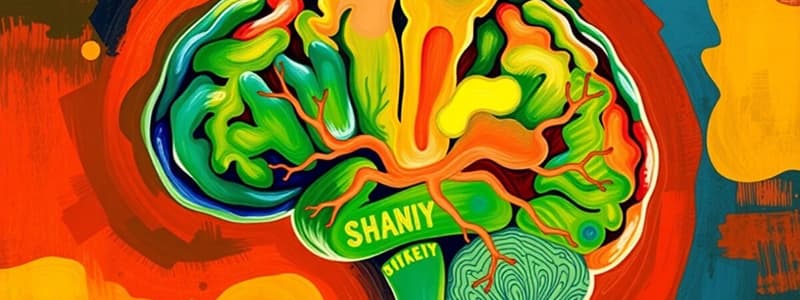Podcast
Questions and Answers
Which of the following best describes the function of an endocrine gland?
Which of the following best describes the function of an endocrine gland?
- They have both endocrine and exocrine functions.
- They secrete hormones through ducts.
- They only secrete hormones in response to nervous stimulation.
- They release hormones directly into the bloodstream. (correct)
What role does the hypothalamus play in the endocrine system?
What role does the hypothalamus play in the endocrine system?
- It regulates the secretion of digestive hormones.
- It secretes hormones that directly act on target organs.
- It connects the nervous system and the endocrine system. (correct)
- It acts as a primary endocrine gland independent of the pituitary.
How do neurohormones from the hypothalamus primarily reach the anterior pituitary?
How do neurohormones from the hypothalamus primarily reach the anterior pituitary?
- Through ducts leading directly to the pituitary.
- Through specialized portal vascular system. (correct)
- By neural impulses transmitted through the spinal cord.
- Via general circulation in the bloodstream.
What type of feedback loop is primarily responsible for regulating hormone levels in the endocrine system?
What type of feedback loop is primarily responsible for regulating hormone levels in the endocrine system?
Which of the following glands is NOT part of the endocrine system?
Which of the following glands is NOT part of the endocrine system?
What primarily controls the neurosecretory cells of the hypothalamus?
What primarily controls the neurosecretory cells of the hypothalamus?
What is the function of the hypothalamo-hypophysial tract?
What is the function of the hypothalamo-hypophysial tract?
What is the role of short feedback loops in the endocrine system?
What is the role of short feedback loops in the endocrine system?
What is the primary role of growth hormone in the body?
What is the primary role of growth hormone in the body?
Which hormone is responsible for the regulation of thyroid gland activity?
Which hormone is responsible for the regulation of thyroid gland activity?
Which hormone acts as the primary inhibiting factor for prolactin secretion?
Which hormone acts as the primary inhibiting factor for prolactin secretion?
What type of hormones do the gonadotropic hormones primarily influence in females?
What type of hormones do the gonadotropic hormones primarily influence in females?
In addition to stimulating bone growth, what other key effect does growth hormone have on metabolism?
In addition to stimulating bone growth, what other key effect does growth hormone have on metabolism?
What is the method of action of growth hormone involving IGF-I?
What is the method of action of growth hormone involving IGF-I?
How does adrenocorticotropic hormone (ACTH) primarily function within the endocrine system?
How does adrenocorticotropic hormone (ACTH) primarily function within the endocrine system?
What is the function of thyrotropin releasing hormone (TRH)?
What is the function of thyrotropin releasing hormone (TRH)?
Flashcards are hidden until you start studying
Study Notes
Endocrine Glands
- Ductless glands that release hormones directly into the bloodstream
- Hormones travel to target sites to exert their effects
- Consists of:
- Hypothalamus
- Pituitary gland
- Thymus gland
- Thyroid gland
- Pancreas
- Adrenal gland
- Reproductive system
Hypothalamic-Pituitary Unit
- Hypothalamus connects the nervous and endocrine systems
- Posterior pituitary contains axons from neurons in the hypothalamus
- Hormones synthesized in the hypothalamus are transported to the posterior pituitary for release
- Neurohormones are synthesized in the hypothalamus and transported to the anterior pituitary via a portal vascular system
- Hypothalamic connections with the pituitary gland:
- Vascular connection (hypothalamo-hypophysial portal circulation)
- Nervous connection (hypothalamo-hypophysial tract)
Control of the Endocrine System
- Negative feedback loop regulates hormone levels
- Hypothalamus secretes releasing and inhibiting hormones that control pituitary hormone secretion
- Pituitary hormones control the secretion of hormones from target glands
- Long feedback loops: Hormones from target glands feedback to the hypothalamus and pituitary to regulate their own secretion
- Short feedback loops: Anterior pituitary hormones feedback to the hypothalamus to regulate their own secretion
Hypothalamic Neurosecretory Cells
- Controlled by:
- Signals from brain areas in response to internal and external stimuli, including stress
- Short feedback loops from anterior pituitary hormones
- Long feedback loops from endocrine glands
Anterior Pituitary Hormones and their Regulation
- Releasing hormones: Stimulate the release of specific anterior pituitary hormones
- Inhibiting hormones: Inhibit the release of specific anterior pituitary hormones
- Anterior Pituitary Hormones:
- Growth hormone (GH): Regulated by growth hormone-releasing hormone (GH-RH) and somatostatin
- Prolactin: Regulated by prolactin-releasing hormone (PRH) and dopamine (prolactin-inhibiting hormone, PIH)
- Thyroid stimulating hormone (TSH): Regulated by thyrotropin-releasing hormone (TRH)
- Adrenocorticotropic hormone (ACTH): Regulated by corticotropin-releasing hormone (CRH)
- Gonadotropic hormones (FSH & LH): Regulated by gonadotropin-releasing hormone (GnRH)
Pituitary Gland
- Master gland of the endocrine system
- Anterior pituitary hormone secretion regulated by:
- Hypophysiotropic releasing and inhibiting hormones
- Long feedback loops from hormones of endocrine glands
- Secretes:
- Thyroid stimulating hormone (TSH)
- Adrenocorticotropic hormone (ACTH)
- Gonadotropic hormones (FSH & LH)
- Growth hormone (GH)
- Prolactin hormone
- Oxytocin hormone
- Antidiuretic hormone (ADH)
Anterior Pituitary Hormones and their Functions
- Thyroid stimulating hormone (TSH): Stimulates growth and secretion of the thyroid gland
- Adrenocorticotropic hormone (ACTH): Stimulates growth and secretion of the adrenal gland
- Growth hormone (GH): Stimulates growth of bones and tissues, leading to increased weight and height
- Prolactin: Stimulates milk synthesis
- Gonadotropic hormones (FSH & LH):
- In females, they stimulate maturation of ova and synthesis of female sex hormones
- In males, they stimulate spermatogenesis and production of male sex hormones
Functions of Growth Hormone
- Somatic Growth:
- Growth of long bones: Stimulates proliferation of epiphyseal cartilage
- Growth of soft tissues in muscles and organs
- Metabolic Effects:
- Fat metabolism: Lipolysis
- Carbohydrate metabolism: Anti-insulin effect
- Mechanism of Action:
- Direct action on cells: Diabetogenic action, lipolysis, increased protein synthesis, production of IGF-I by the liver
- Indirect action: Via production of insulin-like growth factor I (IGF-I) by the liver, which then acts on target tissues
Studying That Suits You
Use AI to generate personalized quizzes and flashcards to suit your learning preferences.




